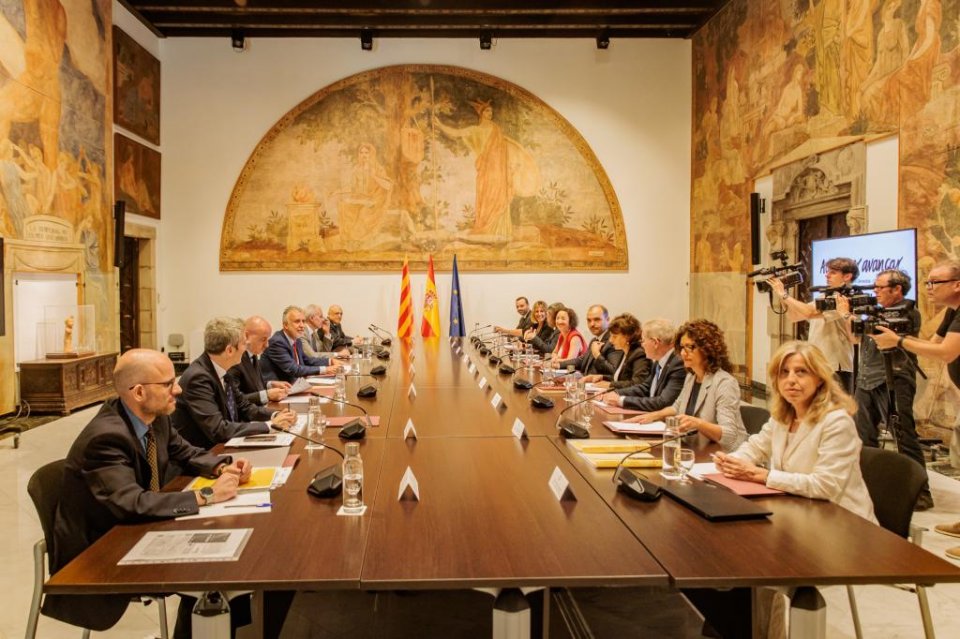Catalonia is set to begin collecting personal income tax (IRPF) from January 2026, following a landmark meeting on Monday between Spain’s central government and the Catalan regional administration aimed at laying the foundation for a revised financial framework.
The new system stipulates that Catalonia, and other autonomous communities that wish to adopt it, will collect all taxes in their regions.
The new ‘singular financing’ agreement – pending ratification by the Spanish Congress – has been labelled a ‘paradigm shift’ in the country’s regional financing arrangements, at least by those who support it.
For decades, many in Catalonia have argued that the wealthy territory pays more to Spain than it gets back. To date, Spain’s system of regional financing has also operated on the basis of expenditure. The new plan will pivot to a revenue-based approach, focusing on the income generated by each autonomous region.
A core principle of the updated model is the enforcement of the so-called ‘principle of ordinality’ – a guarantee that regions contributing more to national coffers won’t end up receiving fewer resources per capita than those that contribute less.
Although tailored specifically for Catalonia, the proposal is structured to be adaptable to other autonomous communities that may wish to adopt a similar system.
The broader aim is to enable the Catalan government to collect all its taxes directly. Catalonia would then remit a payment to the Spanish state to cover national-level expenditures and make an additional ‘solidarity contribution’ to support less affluent regions.
No definitive timeline has been laid out for the full handover of tax collection duties, and implementing the plan will require legislative changes, including updates to the current financing law governing Spain’s autonomous communities.
The agreement was made after a meeting between Spain’s minister of territorial policy, Ángel Víctor Torres and Catalonia’s regional presidency and economy ministers, Albert Dalmau and Alícia Romero.
‘We are talking about a paradigm shift, a new financing framework aimed at improving public services in our country. One that moves toward a model based on shared responsibility, shifting from an expenditure-based system to one based on revenue,’ said Dalmau.
However, he also acknowledged that several ‘complex’ elements still need to be resolved and ruled out full implementation of IRPF collection by the Catalan tax agency in the short term.
‘We need to look at how we strengthen the Catalan tax agency so it can fully manage certain taxes. It currently has 850 employees, while Spain’s tax agency in Catalonia has 4,400. So, there is still significant work ahead,’ he admitted.
Minister Torres, representing the central government, expressed support for the plan, framing it as a reflection of Catalonia’s specific circumstances.
‘What we’ve established today is very important. We’ve been working with an expired financing system from 2014. This agreement is a clear step toward a model that takes into account the distinct features of each region’ he said.
The initiative arises from a political pact between the ruling socialist party (PSOE) and the Catalan pro-independence party, Esquerra Republicana (ERC), which backed the Catalan Socialists’ (PSC) leader, Salvador Illa, to become Catalonia’s president in exchange. ALSO READ: New Catalan government sworn in, ending a decade of pro-independence rule.
In part, the financial agreement is also linked to the overall concessions that Spanish Prime Minister Pedro Sánchez promised in exchange for parliamentary support from all the Catalan pro-independence parties – including Junts de Catalunya (JxCat) – to allow him to serve a new term.
Since he first came to office in 2018, his government has sought to calm pro-independence tensions in Catalonia, most significantly with the controversial amnesty law that was passed in the Spanish Congress just over a year ago. ALSO READ: Spain’s Constitutional Court rejects PP’s appeal and upholds Catalan amnesty law.
The final version of the new financial agreement must still gain approval from the Spanish Congress. Already, some PSOE members from other regions, notably Castilla-La Mancha and Asturias, have raised objections.
The Spanish government maintains that the legal architecture of the model could be extended to other regions that choose to participate and stresses it will honour the ‘unique features’ of each community.
Spain’s first deputy prime minister, María Jesús Montero, stated the government ‘will never promote any policy that causes territorial imbalance’.
She added that the reform seeks to ‘deepen regional powers’ while safeguarding ‘equal opportunities for all regions’.
Meanwhile, the JxCat party reacted critically, calling the agreement ‘very disappointing’ and saying that ‘there is no new financing model, neither singular nor plural’.
The party argued that what has been offered is little more than administrative control over personal income tax collection, with actual decisions still remaining in Madrid’s hands.
The right-wing People’s Party (PP) also pushed back, arguing that the idea of a singular financing system that could be generalised is contradictory.
‘It’s either singular or it’s general,’ said Santi Rodríguez, the PP’s secretary general in Catalonia. ‘We don’t buy it. This is an attempt to conceal what they’re really trying to agree on.’
Rodríguez warned that the proposal ‘could be contrary’ to current regional statutes and insisted that any changes to the financial model must be discussed with all autonomous communities.
He reiterated the PP’s support for improved funding for Catalonia, but only if it’s achieved in a ‘fair, balanced way and without privileges’.
He concluded by stressing that the deal must be debated in Congress and agreed upon through a multilateral process. ‘It cannot be the result of a pact between just two political parties,’ he said.
Subscribe to the Weekly Newsletter from Spain in English.
🆕Acordem els fonaments del nou finançament per a Catalunya
1⃣Situem els ingressos al centre del sistema
2⃣Apostem per la corresponsabilitat fiscal de les autonomies
3⃣Atenem les singularitats de Catalunya i les seves aspiracions d’autogovern i autonomia fiscalCom ho farem? pic.twitter.com/E7zxXkGZBo
— Govern de Catalunya (@govern) July 14, 2025
Click here to get your business activity or services listed on our DIRECTORY.


